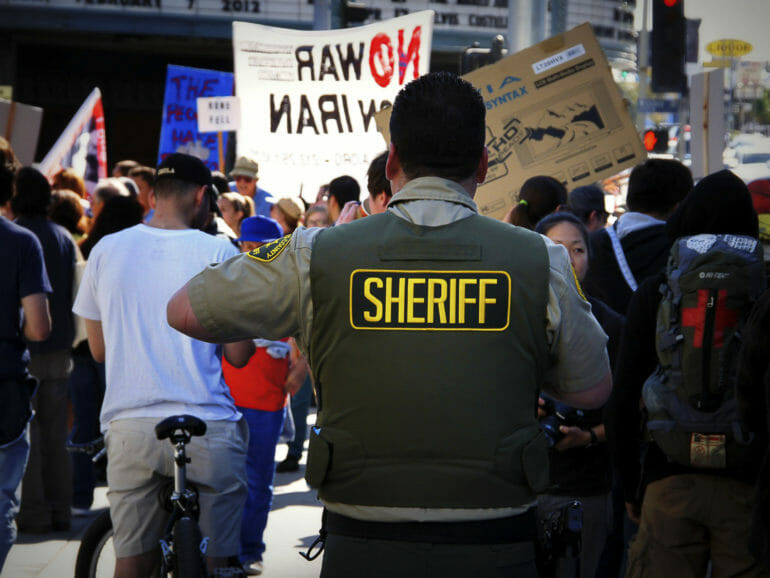As protests advocating for police reform rage on across the U.S., we’ve also been hearing a lot about an old problem: secret gangs among Los Angeles Sheriff’s Department deputies. These gangs are not only accused of violent behavior, but a new report shows they’ve cost L.A. County $55 million in settlements from nearly 60 cases dating back to 1990. In the last decade alone, the county has shelled out $21 million.
The first of these so-called gangs, identified in 1971, called themselves the Little Devils. They were mostly white and patrolled East L.A., a community that was largely Black and Latino. Other gangs include groups like the Banditos in East L.A., the Lynwood Vikings and the 3000 Boys based out of the Men’s Central Jail, who, according to a former employee, would “earn their ink” by breaking inmates’ bones. Members get matching tattoos and have been accused of harassing, threatening, intimidating and assaulting civilians, inmates and fellow deputies. And when people sue over the behavior of these gangs and win, it’s the county that has to pay up.
In April of 2019, L.A. County Supervisor Sheila Kuehl introduced a motion to gather a chronological list of all claims, lawsuits and settlement agreements since 1990 that involved allegations of an LASD deputy belonging to a secret society.
She was prompted by a lawsuit that alleged several members of the Banditos beat up seven newer deputies at a party in 2018 to enforce a “code of silence.” One rookie said he was strangled until he passed out, while another said he was knocked unconscious. The district attorney’s office declined to file charges in February, noting that surveillance footage was dark and everyone at the party had been drinking.
The motion referenced other cases, too, like a 2014 settlement in which the county paid $1.5 million to a female deputy who said Banditos members repeatedly sexually harassed her. When she refused their advances, the harassment got worse. She was run off the road, slammed into a wall as she held a loaded gun and, at one point, had a dead rat placed under her car.
According to Kuehl’s motion, the county settled another lawsuit for $1.5 million in 2018, in part, because a deputy likely lied under oath when he said he was not a member of an LASD group called The Regulators.
In 1991, U.S. District Judge Terry J. Hatter Jr. called the Vikings a “neo-Nazi, white supremacist gang” while presiding over a civil rights lawsuit in which more than 70 Lynwood residents claimed deputies engaged in brutality and terrorism, particularly against Black and Latino people. At the time, the deputies claimed they were a harmless social club. In 1995, a federal jury awarded more than $600,000 to three Black men who were arrested and later beaten after deputies told them to stop drinking beer on the front lawn of a Lynwood home. That was the first of the suits to wrap, ultimately costing the county over $9 million.
In a more recent case, L.A. County paid $10.1 million to Francisco Carillo Jr., who was accused of participating in a drive-by shooting when he was a teenager. Carillo spent 20 years in prison before his conviction was overturned in 2011. He claimed deputies affiliated with the Lynwood Vikings pushed a witness to choose his photo out of a lineup. That witness told his friends, who later pinned the crime on Carillo. The first witness later admitted he hadn’t seen the shooter and all six witnesses ultimately recanted. Carillo’s case appears in the Netflix documentary series “The Innocence Files.”
Sheriff Alex Villanueva said he’s worked to stop the secret groups and blamed past sheriffs for not doing anything to address an issue that has “been festering since 1990.” But Inspector General Max Huntsman said he hasn’t seen any evidence that Villanueva’s measures have been enacted and claimed his office has been unable to investigate the secret groups because of the “obstruction of the Sheriff’s Department.”
In Kuehl’s 2019 motion, Villanueva is quoted calling the cop groups “benign” and describing “hazing” as making a rookie buy the entire station lunch or work overtime without a jacket. That’s still pretty rude and maybe not a great way to build morale, but it’s also a far cry from the heinous allegations mentioned in the numerous lawsuits.
“For some reason, they pride themselves, the Sheriff’s Department, on having these violent cliques I guess to show the public who’s the boss,” attorney John Sweeney, who has represented families of people killed by deputies, told the Times. “But, you know, what it does is just fosters a horrible relationship between the community that these sheriffs serve.”
In July, attorney Humberto Guizar accused sheriff’s deputy Christopher Hernandez of being a member of the 3000 Boys based on an undated photo in which Hernandez allegedly appears to be flashing a gang sign. Hernandez was one of two deputies involved in the recent shooting death of Andres Guardado, an 18-year-old man shot and killed by deputies in Gardena. Hernandez was a witness to the shooting but did not fire his weapon. Hernandez’s attorney says the men in the photo were making gestures related to the floor they worked on, not a gang.
Also in July, deputy Austreberto Gonzalez alleged that a clique called the Executioners, whose matching tattoos he said feature Nazi imagery, run the Compton station. He claimed Black and female deputies aren’t allowed in the group and accused members of earning their ink after “executing members of the public, or otherwise committing acts of violence in furtherance of the gang.” Villanueva claimed that gangs do not run any of LASD’s stations but noted that he ordered an investigation.
And yesterday, on the heels of Gonzalez’s claim, Compton Mayor Aja Brown said she was harassed by deputies in June. She said they pulled her over as she was driving with her husband and daughter, claiming she ran a red light, which she denies. They ordered her out of her car and searched her vehicle, husband and person for drugs, finding none. She said she filed an official complaint with the department, but has received no real answers.
“We demand justice from the Compton sheriffs, and we will no longer continue to pay you $22 million to terrorize this community,” Brown said, citing the amount Compton pays for its contract with the LASD.

